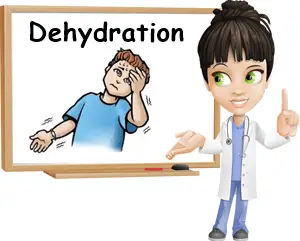Dehydration occurs when our body loses too much fluids to perform optimally. It has been suggested that losing as little as 4% of our total body fluids can lead to severe dehydration and potentially endanger one’s life.
Children, the elderly, heart disease sufferers, anyone engaging in intense physical exercise outdoors, especially during hot weather and anyone suffering from a form of chronic disease which may result in an already weak body is at risk from suffering from the more serious side effects of dehydration.
Fluids are present everywhere in our body and regulated according to specific needs. We lose fluids through evaporation through skin, sweating, exhaling, normal kidney function, diarrhea, vomiting etc. and must take in sufficient liquids to replace them and ensure an optimal level of hydration.
Depending on how much fluids we lose, dehydration may be classified as mild, moderate or severe. But along with water we lose electrolytes and nutrients as well.
Electrolytes such as potassium or sodium help regulate blood volume, blood pressure and heart rate and shortages caused by dehydration can have a deep impact on our health, contributing to a long list of adverse effects.

As mentioned above, there are
The 3 Degrees Of Dehydration
1) Mild dehydration (early dehydration): exhibits few symptoms, mainly thirst or dry mouth.
2) Moderate dehydration, when we exhibit most of the signs and symptoms of the condition.
3) Severe dehydration which is dangerous and requires immediate medical attention.
It’s interesting to note that not many people associate symptoms such as thirst, dry mouth, dry throat or dry lips with dehydration, mostly because such symptoms are fairly common and we tend to experience them relatively often.
Because they do not produce immediate and visible side effects, they are not seen for what they are: signs we need to drink more water.
When is dehydration dangerous?
Dehydration is dangerous not matter how far along it is because of its impact on vital systems (cardiovascular, respiratory, kidney function and so on).
While a healthy body might withstand it well and recover fairly soon even from severe dehydration, heart disease sufferers, for example, risk having a heart attack, the elderly may faint and thus expose themselves to bone fracture, head injuries etc.
What causes dehydration?
Here are the 10 most common causes we get dehydrated:
1) Hot weather and humid climate. When temperatures are high, we lose liquids faster than we may be able to replace them. Humidity further causes sweating which predisposes to dehydration.
2) Intense physical exercise and sweating. Strenuous physical activity causes fluid loss and electrolytes imbalance.
3) Not drinking sufficient water. Some people just don’t drink enough fluids.
4) Fever due to infection or disease.
5) Diarrhea that continues for more than two days, especially in children and the elderly.
6) Vomiting – not being able to keep food or water down increases dehydration risks.
7) Injury: burns, sores, bleeding or any injury, infection or disease of the skin that may favor fluid loss.
8) Disease: hyperglycemia, diabetes, kidney problems, liver problems, cholera etc.
9) Too much sodium.
10) Lack of access to clean water.

14 Signs and symptoms Of Dehydration
Whether we associate them with the condition or not, the most common signs and symptoms of dehydration include:
1) Thirst
Just feeling thirsty is a sign we need to drink more liquids, preferably water or even sports drinks which contain electrolytes and minerals such as potassium, sodium, magnesium etc.
2) Dry mouth and dry throat
If you have laryngospasms, pollen allergies or asthma, it might be best to correct dehydration by drinking some water (taking small sips every now and then) because a dry mouth or throat can trigger a laryngospasm, allergy or asthma episode.
3) Chapped lips
The mouth is one of the first to become dry and chapped lips usually follow soon. Drinking liquids to rehydrate yourself and applying a lip balm to lock moisture in the lips will help. Dehydration may also cause skin to look dry, dull and lifeless, sebum production to increase etc.
4) Fast heart beat or palpitations
When we get dehydrated, we lose fluids from different parts of our body, including a small part of our blood plasma, a liquid component that makes up more than half of our blood.
Dehydration causes us to lose not only fluids, but also potassium, magnesium, sodium and other electrolytes in our blood plasma which regulate blood volume and blood pressure as well as heart function, potentially resulting in tachycardia.
5) Low blood pressure
Fluid loss leads to low blood plasma levels and low electrolytes levels which in turn affect cardiovascular function. Losing part of our blood volume as well as the electrolytes in it due to dehydration, particularly sodium, leads to hypotension or low blood pressure.
Donating blood or just plasma causes, in turn, dehydration because we are basically giving away a part of our body’s liquids and can lead to low blood pressure, low heart rate and weakness.
6) Sweating
Intense sweating indicates our body is losing fluids and we are getting dehydrated. Whether it is a result of intense physical exercise or hot weather, sweating needs to be corrected by drinking sufficient liquids.
7) Infrequent or too frequent trips to the bathroom
When our kidneys are eliminating too little fluids, it means we are dehydrated. When they are eliminating too much, we risk becoming so. Color is also an important indicator.
Pale yellow tells us we are sufficiently hydrated, while dark yellow, orangy and dark brown are signs we need to up our water intake fast. If left uncorrected, dehydration can prevent our kidneys from filtering toxins and affect their function and our health.
8) Headaches
Because of the fluid loss, there is a drop in blood volume. This means a decrease in blood flow and oxygen to the brain, hence the headaches. Dehydration headaches can be strong and occur suddenly, but end just as abruptly as they begin. Lifting and any form of physical exertion can worsen them.
9) Tiredness, fatigue, lethargy, sleepiness, weakness
Because of its effects on the cardiovascular system, dehydration engenders symptoms of fatigue which can manifest as a varying degree of tiredness or even sleepiness. This weakness can result in losing balance for a brief moment or weakness in the legs or arms (for example, not being able to lift the arms above the head).
10) Irritability, nervousness
When we feel tired, even the simplest of tasks become difficult and may come to irritate us. Dehydration causes tiredness, fatigue and thus irritability and an overall bad mood.
11) Increase in body temperature
This can occur if we lie in the sun for too lung, spend too much time outside during hot weather or engage in intense physical exercise when temperatures are high.
The increase in body temperature may present itself as burning hands, chest, face or feet, flushed cheeks, face redness, muscle cramps and heavy sweating and may result in heatstroke.
12) Lightheadedness or dizziness and confusion
Lightheadedness can be a result of a drop in blood pressure brought on by low plasma levels (low blood volume). Mental fog or the inability to focus are also possible in dehydrated individuals.
Lightheadedness can also be explained by low blood volume which limits brain oxygenation to the point it causes us to fell lightheaded. Confusion is another fairly common, but dangerous symptom of severe dehydration.
13) Nausea, loss of appetite and hypoglycemia
It is common for dehydrated people to not feel hunger, sometimes even nausea or a strange aversion towards food and eating. This can happen especially when during hot weather (a heat wave). But not eating even for several hours can cause our blood sugar levels to drop and result in hypoglycemia and a feeling of unwell. Hypoglycemia can engender health complications.
14) Loss of consciousness, fainting
In cases of severe dehydration, loss of consciousness may occur. Fainting is dangerous because it can result in injury (head trauma, bone fractures in people with osteoporosis or the elderly), or even indicate a serious cardiovascular event such as a heart attack, particularly in individuals with a history of cardiovascular disease. Taking measures to prevent and remedy dehydration can save lives.
Dehydration is particularly dangerous for an already weak body. Children, the elderly and anyone suffering from an infection, debilitating condition or chronic disease are more likely to experience the more severe effects of dehydration.
Complication can arise fairly easily if the loss of fluids and the loss of electrolytes are not corrected in time and even endanger one’s health and life.
